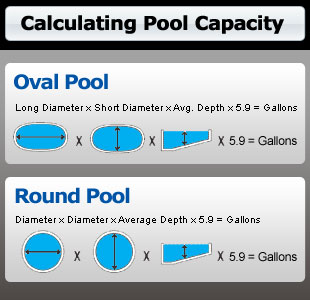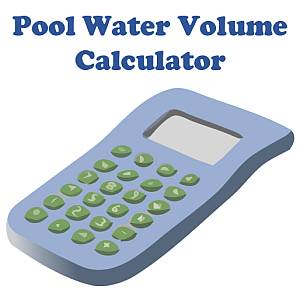Calculating the volume of water in your swimming pool is essential for proper maintenance and chemical treatment. Knowing the volume of water in your pool helps you determine the correct amount of chemicals to add, ensures proper circulation, and aids in determining the right filtration system for your pool. In this article, we will guide you through the process of calculating the water volume of your pool.

Credit: www.wikihow.com
Measuring the Dimensions of Your Pool
The first step in calculating your swimming pool’s water volume is to measure the dimensions of your pool. Most pools are not a simple rectangular shape, so you may need to break down the pool into sections to get an accurate measurement. Here are the common shapes of swimming pools and how to measure them:
Rectangular Pools
For rectangular pools, measure the length, width, and average depth of the pool. The formula to calculate the volume of a rectangular pool is:
Volume = Length x Width x Average Depth
Oval Pools
For oval pools, measure the longest diameter (major axis), shortest diameter (minor axis), and average depth. The formula to calculate the volume of an oval pool is:
Volume = 0.8 x Length x Width x Average Depth
Irregular Shape Pools
For irregularly shaped pools, you may need to divide the pool into sections and calculate the volume of each section separately. Once you have the volume of each section, add them together to get the total volume of the pool.

Credit: sipoolandspa.com
Calculating the Water Volume
Once you have measured the dimensions of your pool, you can calculate the water volume using the appropriate formula based on the shape of your pool. Here are the steps to calculate the water volume:
- Measure the length, width, and depth of your pool.
- Plug the measurements into the corresponding formula for your pool shape.
- Calculate the volume using the formula.
- Convert the result to gallons or liters based on your preference.
Example Calculation
Let’s say you have a rectangular pool with the following dimensions:
- Length: 20 feet
- Width: 10 feet
- Average Depth: 5 feet
Using the formula for a rectangular pool:
Volume = 20 x 10 x 5 = 1000 cubic feet
To convert cubic feet to gallons, use the conversion factor of 7.48:
1000 cubic feet x 7.48 = 7480 gallons
Importance of Knowing Your Pool’s Water Volume
Knowing the volume of water in your swimming pool is crucial for various reasons:
- Helps in determining the right amount of chemicals to add for proper water treatment.
- Aids in selecting the appropriate filtration system based on the pool volume.
- Ensures proper circulation and distribution of chemicals throughout the pool.
- Facilitates accurate troubleshooting of any water quality issues.
Frequently Asked Questions
Q: Why is it important to calculate the volume of a swimming pool?
A: Knowing the volume of your pool is crucial for proper chemical treatment, ensuring the effectiveness of filters, and maintaining balanced water chemistry. It also helps in determining the correct pump size and estimating heating costs.
Q: Are there online calculators available for pool volume calculations?
A: Yes, many online calculators can help you determine your pool’s volume by inputting the necessary measurements. These calculators can handle various pool shapes and simplify the calculation process.
Q: What tools can help with measuring pool dimensions accurately?
A: A tape measure or laser distance measure can help you measure the length, width, and depth of your pool accurately. For depth, a long measuring stick or a weighted line can be used to reach the pool floor.
Final Words
Calculating the water volume of your swimming pool is an essential step in pool maintenance. By following the steps outlined in this article, you can accurately determine the volume of water in your pool and ensure proper chemical treatment and filtration. Knowing your pool’s water volume will help you keep your pool clean, safe, and enjoyable for swimming all year round.





